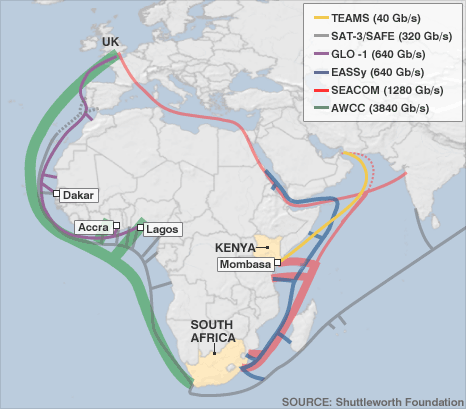Speedy internet connections have yet to take off in many parts of South Africa because of a shortage in bandwidth.
One leading internet provider says it is not to blame for the slow connection, but frustrations have led one IT group to adopt an unusual method of delivery.
Al Jazeera’s Haru Mutasa reports on the pigeon that beat the internet in Johannesburg.
Service providers across the continent blame the expensive and slow Internet reality for much of Africa on a shortage of connectivity, particularly between Africa and the rest of the world. One African-owned firm, Seacom hopes to change that with the introduction of a new fiber optic cable that went live in July. The new connection enhances service between much of East Africa, including South Africa, Tanzania, Kenya, Uganda and Mozambique. The cable also provides a new path to reach Europe and Asia at speeds superior to what used to be common across Africa.
But while bandwidth may slowly be on the increase, savings are much harder to find. Businesses routinely pay $600 per month for 1Mbps service. But some providers suggest that does represent savings. Satellite service at the same speed is priced at an average of $3,000 per month.
Consumers in South Africa find broadband pricing very high, with most relying on Telkom, the nation’s primary phone company, for DSL service. Usage caps are prevalent across the continent as well, stifling the development of African broadband services and making services like online video all but unaffordable.
Thanks to Stop the Cap! readers Jeff, Bones, Terry, and a few others who let us know about this story.


 Subscribe
Subscribe

Heh, just to think about it, it is very humiliating to see that a DSL connection (which the provider claims they have no fault in providing a low service) would be outperformed by a pigeon, but of course seeing the small amount of bandwidth Africa seems to have going to it, I wouldn’t be too surprised. I am glad to hear of the increasing amount of bandwidth going to the continent, so that would be a plus. Undersea fiber cable takes a while to lay. Also thinking about it, a T1 for many businesses in my area costs $350-1,500 at… Read more »
I’m curious why nobody has set up a microwave wireless network for in-country connectivity, at least between customers of the same ISP. Such a network wouldn’t cost that much, and could get 100 Mbps per tower, so 10 Mbps service to customers as long as they’re on the same network. Going to other providers’ networks would be tougher, as far as bandwidth pricing goes, but if everyone’s on one fast network things might not be as bad for intrastate communications. Just a thought. Though it’s absolutely true that undersea cables need to be laid if at all possible to alleviate… Read more »
Strangely enough, the pigeon refused to repeat the stunt. Apparently the data stick that the Pigeon carried was 5GB in size which used up the pigeon’s monthly “customary usage”. It’s a shame, really.
This experiment is genius. Instead of just threatening or joking to compare the internet with pigeons, Unlimited IT actually did. And the best part? The pigeon was much faster! But while this is a quirky/hilarious story, the issue at hand–incredibly slow internet and cable in South Africa–is not all that funny. Particularly for South Africans. Telkom and the government will certainly hear about this “experiment”–it is all of the news, after all. But that does not mean they will do anything. Thus, the biggest test of success for Unlimited IT (and really any business or individual in need of more… Read more »